翻译认知心理学共15页文档
最新第十章 认知心理学 认知心理学(cognitive psychology有【精选ppt】幻灯片课
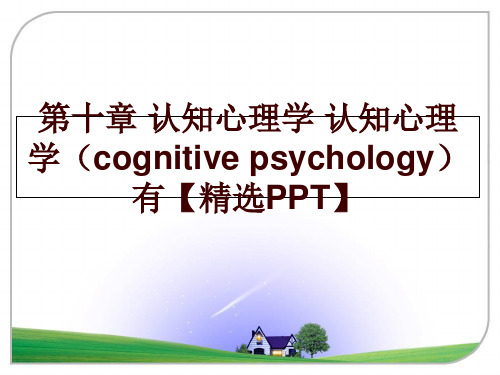
几个代表 人物
赫伯特·西蒙-----是一个传奇式的人物,很难用一个具 体的头衔来形容他:他1943年获得了美国芝加哥大学 政治学博士学位,但现在,他却在卡内基一梅隆大学 任计算机和心理学教授。那么,他就是一个计算机学 家和心理学家吗?也不完全正确。事实上,他在1978年 获得了诺贝尔经济学奖(世界上第一位获奖的心理学家)。 他的研究领域横跨了心理学、计算机科学和经济管理 学。他传奇式地将这几个领域的研究整合到了一起, 并在每一个领域都取得了专门从事该领域的人都难以 企及的成就。除诺贝尔经济学奖外,他还获得了美国 心理学会杰出贡献奖(1969年),美国心理学会终身贡献 奖(1993年),计算机领域的国际最高奖项——图灵奖 (1975年)以及其他大大小小数不清的奖项。
2、英剑桥大学的心理学家布鲁德本特运用信息加工观 点处理人的知觉、注意以及信息通道等心理学问题, 开创了信息论在心理学中应用的先例。
(三)计算机科学或人工智能研究的影响
1、计算机科学对信息加工理论的形成提供了技术工具、
描述性的语言和有关计算理论方面的基础,对其形成 和发展起到了决定性的作用。
2、图灵的图灵机(Turing machine)和图灵检验(Turing test) 及西蒙和纽厄尔的人工智能研究,促进了认知心理学 的发展,从六十年代后期开始,信息加工认知心理学 逐步成为心理学发展中的主流。
1949年西蒙应邀来到卡内基—梅隆大学,先是 任行政学与心理学教授(1949~1955),后来 任计算机科学与心理学教授终生。西蒙作为该 大学工业管理研究生院的创办人之一,开创了 组织行为和管理科学两大学术领域的研究,承 担了组织理论家、管理科学家和商学院行政管 理者的工作,他指导并帮助该研究生院成为美 国最好的商学院之一。西蒙不仅执教于著名大 学,也活跃于企业界、行政机构及多种顾问公 司。他对管理学上组织理论的研究有独特的见 地,不但是专业研究的先锋,更是行为科学的 代表性学者。
认知心理学(详解)

第五节 认知心理学的实质
1、信息加工观的心理学结论 (1)心理学应当研究行为的内部机制(内部心 理活动); (2)心理过程可以理解为信息的加工过程; (3)能够建立心理过程的计算机模型
认知心理学的实质在于它主张研究认知活动本身
的结构和过程,并且把这些心理过程看作信息加工 的过程。
认知研究与神经机制研究的关系:心理的认知过
(三)康德哲学思想的影响
18世纪后半期,康德企图调和历史上的经验论和先 验论,把知识的形式和知识的质料这两种认识成分 统一起来。他认为,只有知识的质料(即感觉要素) 是来自经验的,知识的形式则不然,它是先天的。 康德将知识的各种形式统称为知识的先验要素 (transcendental element),并把它们分为感 性的先验要素(如时间和空间)和逻辑的先验要素。
格拉斯(Glass,A.L.,1985)在《认知》一书中 指出:“我们所有的心理能力(知觉、记忆、推 理及其它等)组成一个复杂的系统,它们的综 合功能就叫认知。研究人类认知的心理学的
这个分支,就叫认知心理学。从根本上说,
认知心理学研究知识及人怎样使用知识。由
于这个原因,认知心理学也叫信息加工心理 学”。
会背景
信息加工的认知心理学是现代美国社会发展需要 的产物。第二次世界大战以前,几乎所有心理学的 研究都局限在实验室之中。当时研究者大都以行为 主义为范式,主要研究动物和人的外部行为,很少 涉及内在心理历程。即使少数有关人的知觉、思维、 情绪等的研究,也深受行为主义观点的束缚。
第二次世界大战开始改变了这种状况。战争需要心 理学的服务,战争又直接推动了心理学的发展。首 先,对人的认知提出了更高的要求。其次,突出了 人的操作技能的研究。
二节 认知心理学的研究对象
第二章 翻译的心理语言认知过程概要
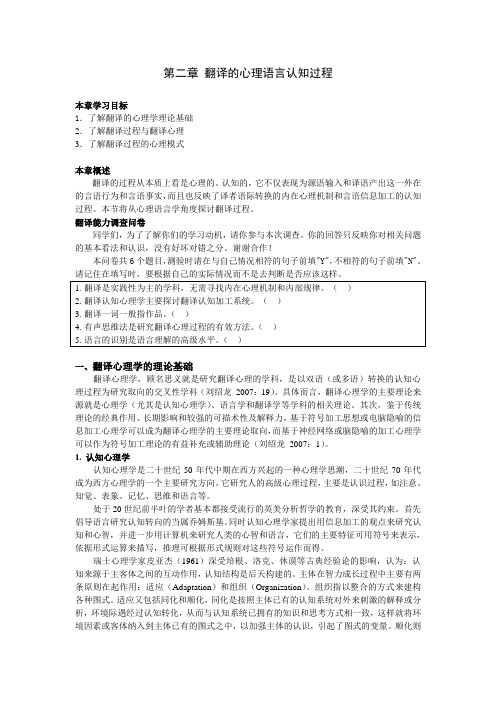
第二章翻译的心理语言认知过程本章学习目标1.了解翻译的心理学理论基础2.了解翻译过程与翻译心理3.了解翻译过程的心理模式本章概述翻译的过程从本质上看是心理的、认知的,它不仅表现为源语输入和译语产出这一外在的言语行为和言语事实,而且也反映了译者语际转换的内在心理机制和言语信息加工的认知过程。
本节将从心理语言学角度探讨翻译过程。
翻译能力调查问卷同学们,为了了解你们的学习动机,请你参与本次调查。
你的回答只反映你对相关问题的基本看法和认识,没有好坏对错之分。
谢谢合作!本问卷共6个题目,测验时请在与自己情况相符的句子前填"Y",不相符的句子前填"N"。
请记住在填写时,要根据自己的实际情况而不是去判断是否应该这样。
1.翻译是实践性为主的学科,无需寻找内在心理机制和内部规律。
()2.翻译认知心理学主要探讨翻译认知加工系统。
()3.翻译一词一般指作品。
()4.有声思维法是研究翻译心理过程的有效方法。
()5.语言的识别是语言理解的高级水平。
()一、翻译心理学的理论基础翻译心理学,顾名思义就是研究翻译心理的学科,是以双语(或多语)转换的认知心理过程为研究取向的交叉性学科(刘绍龙2007:19)。
具体而言,翻译心理学的主要理论来源就是心理学(尤其是认知心理学)、语言学和翻译学等学科的相关理论。
其次,鉴于传统理论的经典作用、长期影响和较强的可描术性及解释力,基于符号加工思想或电脑隐喻的信息加工心理学可以成为翻译心理学的主要理论取向,而基于神经网络或脑隐喻的加工心理学可以作为符号加工理论的有益补充或辅助理论(刘绍龙2007:1)。
1. 认知心理学认知心理学是二十世纪50年代中期在西方兴起的一种心理学思潮,二十世纪70年代成为西方心理学的一个主要研究方向。
它研究人的高级心理过程,主要是认识过程,如注意、知觉、表象、记忆、思维和语言等。
处于20世纪前半叶的学者基本都接受流行的英美分析哲学的教育,深受其约束。
CognitivePsychologyII认知心理学讲课文档
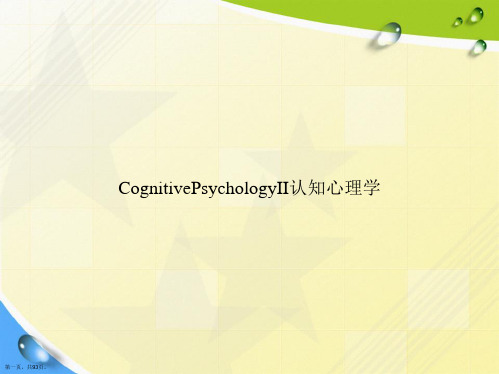
6岁儿童和14岁少年在完成某项认知任务时,所使用的认知操作各是什么 ? What are the cognitive operations used by 6 years old children and 14 years old children, while performing on a cognitive task,?
Suppose, we are looking at the newspaper while listening to radio at the same time, we attend all the characters and sounds unconsciously, in fact, these activities contain very complex cognitive mechanism
智力包含思维,思维是智力中的灵魂。Intelligence consists of thinking, while thinking is the soul in intelligence
从广义的角度使用“认知”这个概念时,其含义与“智力”的含义等同;当 从狭义的角度使用时,其含义与“思维”更接近。From the angle of the generalized concept of "cognition", the adequate implication of the meaning of “intelligence” is formed, and from a narrow concept of it, the meaning of "intelligence" to used for identification.
但心理学家所真正感兴趣的并不是这些容易被观察到的内 容,而是那些潜藏在这些行为下面的加工过程和技能。But
认知心理学解释

认知心理学解释
嘿,你知道吗?认知心理学就像是我们大脑里的神秘魔法师!它在悄悄地影响着我们的一举一动呢!
比如说,当你走在大街上,你怎么能一下子就认出你的朋友呢?这就是认知心理学在起作用呀!它就像一个超级侦探,帮我们处理着各种信息。
你看,你能从那么多人中准确地辨别出那张熟悉的脸,这多神奇啊!
再想想,我们为什么会对某些事情记得特别清楚,而对另一些事情却转眼就忘呢?这也是认知心理学研究的范畴呀!它就好像是我们记忆的管理员,决定着哪些记忆能留下来,哪些会被淘汰。
这不就跟我们整理房间一样吗,有些东西我们会特别珍惜地放在显眼位置,而有些就被丢到角落里甚至扔掉了。
还有啊,我们是怎么理解语言的呢?当别人跟你说话时,你怎么能快速明白对方的意思呢?这也得归功于认知心理学呀!它就如同一个翻译大师,让我们能在语言的海洋里畅游。
就好像学外语,一开始觉得很难,但慢慢掌握了规律,不就越来越得心应手了嘛!
认知心理学还研究我们的决策过程呢!为啥有时候我们会做出明智的选择,有时候又会犯糊涂呢?这就像是在我们心里有个小天使和小恶魔在打架,认知心理学就在观察着这场战斗呢!
哎呀,认知心理学真的太重要啦!它就像我们生活中的隐形伙伴,无时无刻不在影响着我们。
我们的感知、记忆、思维、决策,哪一个离得开它呀!所以啊,我们可得好好了解它,这样才能更好地理解我们自己和这个世界呀!我的观点就是,认知心理学是打开我们内心世界和理解外界的一把重要钥匙,我们绝对不能忽视它的存在和价值!。
(完整word版)认知心理学资料(超强完整版,重点整理突出)
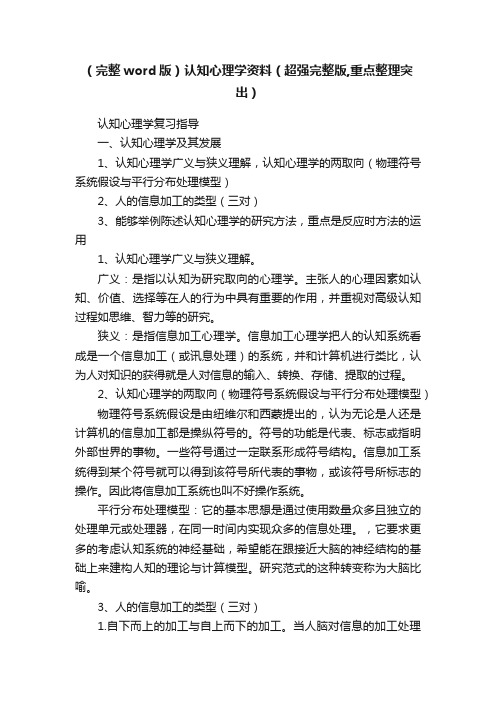
(完整word版)认知心理学资料(超强完整版,重点整理突出)认知心理学复习指导一、认知心理学及其发展1、认知心理学广义与狭义理解,认知心理学的两取向(物理符号系统假设与平行分布处理模型)2、人的信息加工的类型(三对)3、能够举例陈述认知心理学的研究方法,重点是反应时方法的运用1、认知心理学广义与狭义理解。
广义:是指以认知为研究取向的心理学。
主张人的心理因素如认知、价值、选择等在人的行为中具有重要的作用,并重视对高级认知过程如思维、智力等的研究。
狭义:是指信息加工心理学。
信息加工心理学把人的认知系统看成是一个信息加工(或讯息处理)的系统,并和计算机进行类比,认为人对知识的获得就是人对信息的输入、转换、存储、提取的过程。
2、认知心理学的两取向(物理符号系统假设与平行分布处理模型)物理符号系统假设是由纽维尔和西蒙提出的,认为无论是人还是计算机的信息加工都是操纵符号的。
符号的功能是代表、标志或指明外部世界的事物。
一些符号通过一定联系形成符号结构。
信息加工系统得到某个符号就可以得到该符号所代表的事物,或该符号所标志的操作。
因此将信息加工系统也叫不好操作系统。
平行分布处理模型:它的基本思想是通过使用数量众多且独立的处理单元或处理器,在同一时间内实现众多的信息处理。
,它要求更多的考虑认知系统的神经基础,希望能在跟接近大脑的神经结构的基础上来建构人知的理论与计算模型。
研究范式的这种转变称为大脑比喻。
3、人的信息加工的类型(三对)1.自下而上的加工与自上而下的加工。
当人脑对信息的加工处理直接依赖于刺激的特性或外部输入的感觉信息时,叫自下而上的加工。
当人脑对信息的加工处理依赖于人的已有的知识结构时,叫自上而下的加工。
信息加工的早期阶段,自下而上的加工更为明显,后期反之。
2.系列加工与平行加工。
人对输入的信息是依次一个一个的加以处理——系列加工。
同时对所输入的信息进行处理——平行加工。
3.控制性加工和自动化加工。
各种要求意识努力的认知加工——控制性加工。
认知心理学 英文

认知心理学英文Cognitive PsychologyThe field of cognitive psychology has been a subject of intense study and research for decades, as it delves into the intricate workings of the human mind. This discipline aims to understand the processes by which individuals acquire, store, manipulate, and retrieve information, ultimately shaping their perceptions, thoughts, and behaviors. Cognitive psychology has emerged as a crucial branch of psychology, providing valuable insights into the complexities of the human cognitive system.At the core of cognitive psychology lies the concept of information processing. Researchers in this field investigate how the brain and the nervous system process, store, and retrieve information, much like a computer processes data. This approach involves studying various cognitive functions such as attention, perception, memory, language, problem-solving, and decision-making. By understanding these cognitive processes, cognitive psychologists can shed light on how individuals make sense of the world around them and how they navigate through their daily lives.One of the fundamental aspects of cognitive psychology is the study of attention. Attention refers to the ability to focus on specific stimuli or information while filtering out irrelevant or distracting elements. Cognitive psychologists have explored the different types of attention, such as selective attention, divided attention, and sustained attention, and how these processes influence our understanding and interpretation of the world. For instance, research has shown that individuals can selectively attend to certain stimuli while ignoring others, a phenomenon known as the "cocktail party effect," where people can focus on a specific conversation in a noisy environment.Memory, another crucial component of cognitive psychology, has been extensively studied. Researchers have delved into the different types of memory, such as sensory memory, short-term memory, and long-term memory, and the mechanisms by which information is encoded, stored, and retrieved. Understanding memory processes has significant implications for various fields, including education, where cognitive psychologists have contributed to the development of effective learning strategies and techniques.Language, as a uniquely human cognitive function, has also been a central focus of cognitive psychology. Researchers in this field have investigated the cognitive processes involved in language production, comprehension, and acquisition, shedding light on the complexinterplay between language and other cognitive functions. This includes exploring the neural mechanisms underlying language processing, as well as the role of language in shaping our thought processes and problem-solving abilities.Cognitive psychologists have also made significant contributions to the understanding of problem-solving and decision-making. By studying the cognitive processes involved in these activities, researchers have gained insights into how individuals approach and solve complex problems, as well as the factors that influence their decision-making. This knowledge has been applied in various domains, such as organizational management, public policy, and human-computer interaction.Moreover, cognitive psychology has played a crucial role in the development of artificial intelligence (AI) and the field of cognitive science. By studying the cognitive processes of the human mind, cognitive psychologists have provided valuable insights that have informed the design and development of intelligent systems and machines. This interdisciplinary collaboration has led to advancements in areas such as machine learning, natural language processing, and cognitive robotics.In recent years, cognitive psychology has also expanded its scope to explore the relationship between cognition and other aspects ofhuman experience, such as emotion, motivation, and social interaction. This holistic approach has led to a better understanding of how cognitive processes are influenced by and interact with these other psychological domains.As the field of cognitive psychology continues to evolve, it promises to offer even more valuable insights into the complexities of the human mind. By unraveling the intricate mechanisms of cognition, cognitive psychologists can contribute to the development of more effective interventions, educational strategies, and technological solutions that can enhance human performance and well-being. The ongoing research in this field holds the potential to revolutionize our understanding of the human mind and its remarkable capabilities.。
Cognitive Psychology Perception II 认知心理学
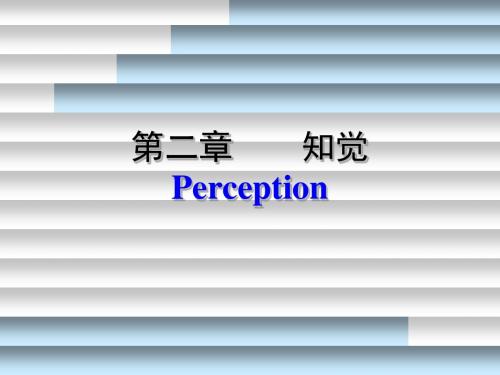
(三)特征分析理论 III: The Feature Analysis Theory
1. 基本思想 The Basic Idea 人在识别一个模式时,将这个模式分解为许多基本特征,再将它们与 储存于记忆中的特征相匹配,然后根据特征的组合来进行模式的分类 。 When recognizing a pattern, people decompose the pattern into a number of basic features, then they will match them with the characteristics stored in the memory, and then based on the combination of these features will classify them of the pattern. 简单地说:我们按照区别性特征把每一种刺激划分成不同的组件,然 后当我们遇到一种刺激,我们就会按照区别性特征来区分我们遇到的 是哪种刺激 To put it simply: We divide each stimuli into different components that are called distinctive features, and then when we encounter a stimulus we compare the features.
